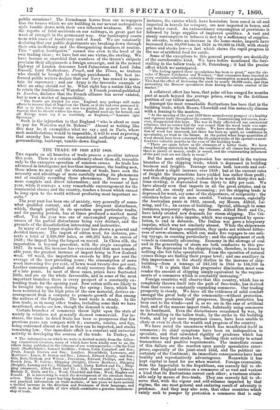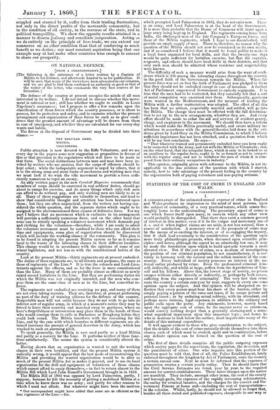THE TRADE OF 1850 AND 1860.
Tile reports on all branches of trade possess a peculiar interest this year. There is a certain uniformity about them all, traceable only to the extensive operation of common causes. As trade has advanced in intelligence not less than importance, the leading men, those whom we may call the statesmen of trade, have seen the necessity and advantage of more carefully noting its phenomena and of candidly recording those phenomena. Hence we have more complete and direct information ; and the resume of last year, while it conveys a very remarkable encouragement for the commercial classes and the country, teaches a lesson which cannot be long open to the world without producing most important re- sults.
The year past has been one of anxiety, very generally of somee what qualified content, and of rather frequent disturbance, which, though partial in its operation upon particular trades, and for passing periods, has at times produced a marked moral effect. Yet the year was one of unexampled prosperity, the causes of the partial disturbance being very distinct, and the grounds of the dissatisfaction interesting and instructive.
In many of our larger staples the year has shown a genera], and decided increase. The import of cotton wool, for instance, pre- sents a total of 2,828,900 bales, or 386,262 bales in excess of 1858; the import being the largest on record. In China silk, the importation is beyond precedent, with the single exception of 1857. In wool, the increase has even exceeded that most remark- able year, the greatest increase of import being in New Zealand wool. Of wood, the importation exceeds by fifty per cent the average of the four preceding years ; the consumption of sawn wood increasing five per cent, of hewn wood twenty-five per cent. Leather announces gradual and steady recovery from the effects of a late panic. In most of these cases, prices have fluctuated little, and are on the whole favourable, and in some of the most important branches there is every prospect of a constantly ex- tending trade for the opening year. New cotton mills are likely to be brought into operation during the spring ; linen, which has been restricted by the high price of the raw material, derives en- couragement from a company to promote growth of flax among the natives of the Punjaub. The wool trade is steady. In the iron trade' as in many other trades including some that we have mentioned, stocks are low, though the demand is steady. Certain branches of commerce throw light upon the state of society in relations not generally deemed commercial. For in- stance, the trade in dried fruits has been so prosperous that few previous years can compare with it ; currants, raisins, and figs, being. consumed almost as fast as they can be imported, and stocks remaining low. One immediate effect is a constant and universal
i
activity n developing the sources of the trade. In Turkey, for * The information on which we write is derived mainly from the follow- ing commercial circulars, many of which have been kindly sent to us, the others being published in the columns of our contemporanes :—On the Coal trade (Staffordshire), Samuel Griffiths ; Cotton, Colin Campbell and Son ; Fruit, Joseph Travers and Son ; Leather, Streathfield, Lawrence, and Mortimer ; Linen, D. Derrar and Son ; Linseed, Edward Eastty, and Son; Oils, Rose, Graham and Wilson ; Provisions, 'Edward, Phillips, and Son ; Scotch Iron W. Colvin ; Shipping (freight), Glover Brothers ; Shipping (freight), Laming and Co;; Shipping (sale), Curry Kellock and Co. ; Ship- ping (steamers), Alfred Brett and Co. ; Silk, Durant and obacco, Horatio N. Davis and Co. ; Wood, Churchill and Sim' Wool, Co.;&ghee and Ronald. It is interesting to watch the development of the circulars them- selves. This class of paper has long furnished most valuable, trustworthy, and practical information on trade matters • of late years we have noticed a decided increase in the direction and frankness of their language, and Still more in that breadth of view which constitutes a genuine statesman- ship of trade.
instance, the raisins which have heretofore been cured in oil and imported in barrels for reexport, are now imported in boxes, and are better cured. An extraordinary consumption of provisions is followed by large supplies of improved qualities. A vast and steady consumption in tobacco is met by a sufficiency of supplies. In oil-cake, besides an increase in the home-make, imports have increased from 80,000 tons in 1858 to 90,000 in 1859, with steady prices and stocks low—a fact which shows the rapid progress in the use of artificial food for cattle.
Some of the exceptions to this general prosperity are decidedly of the corroborative kind. We have before mentioned the fore- stalling in the tallow trade at St. Petersburg ; it had the precise effect which we.anticipated.
" The feeling against these speculations has been so great," says the cir- cular of Messrs. Colchester and Woolner, " that consumers have resorted to every available substitute, curtailing their consumption as much as possible. This had the effect of increasing the stock by nearly 20,000 casks and thus preventing the Moscow speculators from having Elie entire control of the market."
A collateral effect has been, that palm oil has ranged for months past at much beyond the average prices, owing to the fictitious position of our tallow market.
Amongst the most remarkable fluctuations has been that in the building trade, which Messrs. Churchill and Sim naturally discuss with a leaning to the masters.
"At the opening of the year 1859 there seemed every prospect of a healthy and vigorous trade throughout the country. Counteracting influences, how- ever disappointed this hope. The war in Italy affected all our commercial relations, and no sooner had the war ceased than the wood trade was espe- cially damaged by the builders' strike. We have shown that the consump- tion of wood has increased, but there has been no spirit, no confidence in speculation, no trust in the future. At the period when large quantities of wood should have been consumed the ill-judged strike of the operatives sacri- ficed two valuable months in the year of the building trade. "There are again before us the elements of a better trade. We have cheap building materials in hand, the condition of all classes has improved, there is plenty of money, credit is sound, and the counteracting influences of the past year are not likely to recur."
But the most striking depression has occurred in the various branches of the shipping trade, which is depressed in building business and freights. Tonnage entries both inwards and out- wards show a slight increase over 1858; but at the current rates of freight the transactions have yielded loss rather than profit; and thus shipping property, reckoned to be worth thirty-five mil-
lions sterling, is depreciated from thirty to fifty per cent. We have already seen that imports in all the great articles' and in
almost all, are steady and increasing ; yet the shipping trade is
depressed for want, say some of the shipowners, of reciprocity : -the circulars before us are more candid. Various causes especially the Australian panic in 1853, caused, say Messrs. Alfred, La- ming, and Co., an excess of building. Special, although in some instances, temporary objects, say Messrs. Alfred Brett and Co., have lately created new demands for steam shipping. The Cri- mean war gave a false impulse, which was exaggerated by specu- lation, to end in delusion. The Italian war gave a temporary impulse, which was not similarly abused. While the shipowners complained of foreign competition, they spoke not without bitter- ness of screw-steamers, which can make five voyages to one sail- ing voyage, in coasting particularly ; and the employment of such vessels is constantly advancing. Economy in the stowage of coal and in the generating of steam are both conducive to this pro- gress. The depression in the shipping trade therefore, is traced to nothing else but false speculation. From the operation of natural causes things are finding their proper level; and one auxiliary in this improvement is the steady decline in the increase of ship- building—from a tonnage of 242,182 in 1855 to 154,930 m-
1858. It is plain that this progressive diminution must soon render the amount of shipping simply equivalent to the require- ments of a commerce which is constantly increasing." Foreign countries will observe that this country, which has so completely thrown itself into the path of free-trade, has derived from that course a constantly expanding commerce. Our trading prosperity is steady. We have all the evidences of solid comfort amongst the great body of the community—without protection. Agriculture proclaims itself prosperous, though protection has been cast to the winds—and is, as we see in the case of artificial food, and of the manure import trade, habitually using commerce as its handmaid. Even the disturbances occasioned by war, by the forestalling in the tallow trade by the strike in the building trade and by yet more important causes, have been unable to abate or even to check the wealth and progress of the country.
We have noted the uneasiness which has manifested itself in commerce ; its chief symptoms have been an indisposition to speculate, and that unwonted rigidity of prudence which has made men keep their stocks low, limiting their activity to actual transactions and positive requirements. The immediate causes of this failure are the reaction upon purely speculative enter- prises, especially of the joint-stock kind, and the political un- certainty of the Continent ; its immediate consequences have been healthy and reproductively advantageous. Meanwhile it has kept capital in hand for use when wanted. Foreign economistts, from the Imperialist to the Republican, can scarcely fail to ob- serve that England carries on a commerce of so vast and various a kind that its fluctuations correct each other ; a vastness attain- able only by means of free-trade. They can scarcely fail to ob- serve that, with the vigour and self-reliance imparted by. that regime, the one most general and enduring result of adversity is prudence. And they may also note, that other countries which vainly seek to pamper by protection a commerce that is only
crippled and stunted by it, suffer from their trading fluctuations, not only in the direct profits of the mercantile community, but in the condition of all society, in the revenue of the state, and in political tranquillity. We show the opposite results attained in a manner to disarm jealousy and conciliate 'cooperation. Acting as we do entirely on the principle of we can extend our commerce on no other condition than that o conferring as much benefit as we derive ; our most constant aspiration being that our example may at last make other countries wise enough to consent to share our prosperity.



























 Previous page
Previous page